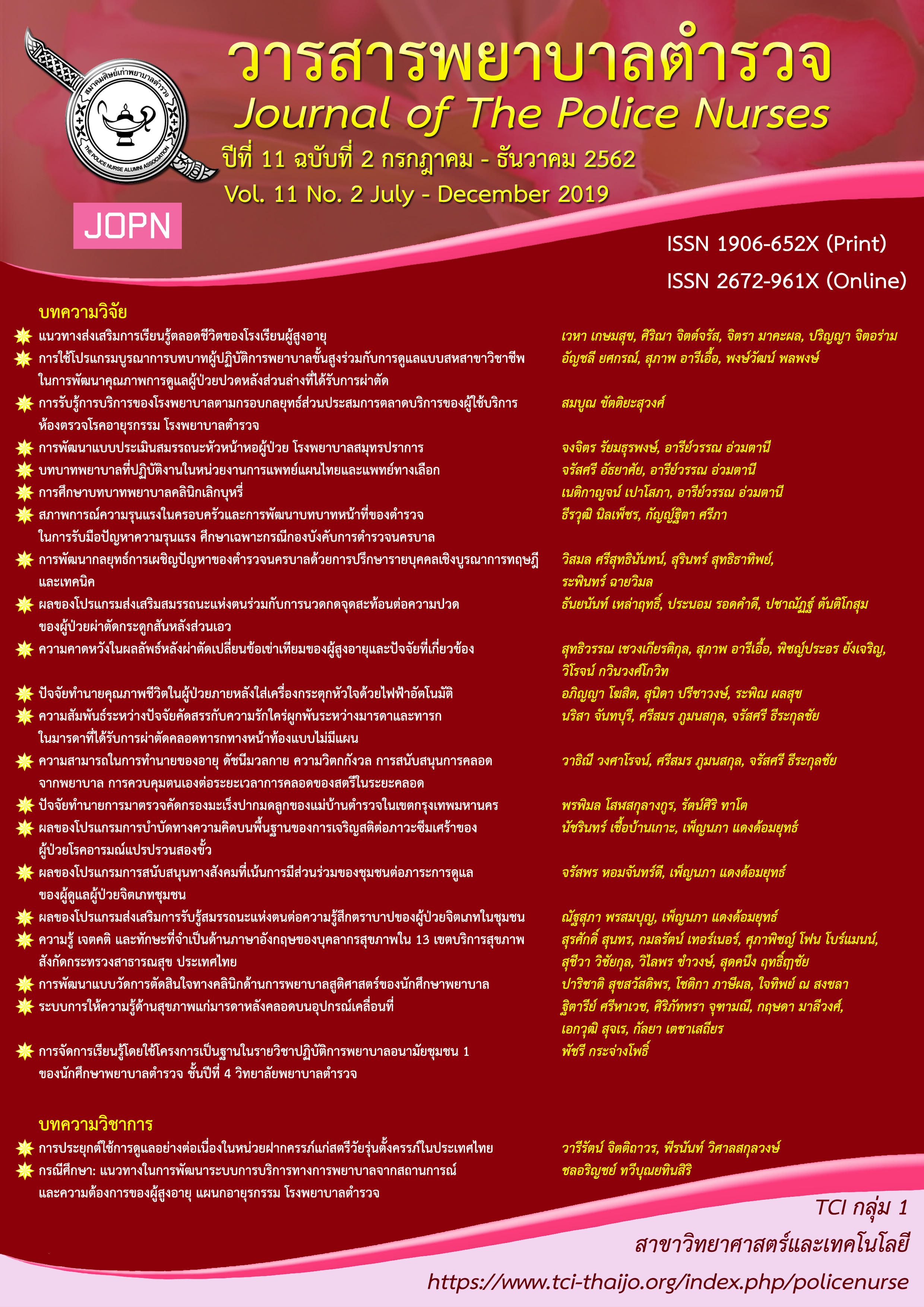A POSTPARTUM WOMEN EDUCATIONAL SYSTEM ON MOBILE DEVICE
Keywords:
education system, postpartum women, mobile web-based applicationAbstract
The purposes of this research were to develop a mobile web-based health education system for postpartum women and to study user satisfaction level. A responsive web application was used as a mean to deliver health information to 125 postpartum women at Pathum-Thani Hospital. Research instruments were online five-scale questionnaires used to collect user satisfaction level and data were analyzed using descriptive statistics including frequency, percentage, mean, and standard deviation.
The results indicated that the overall samples’ satisfaction with a mobile web-based health education system was at a high level (M = 4.48, SD = .51). The satisfaction with the up-to-date information was the highest level (M = 4.68, SD = .60). Their satisfaction with referable knowledge (M = 4.57, SD = .66), well-structured information (M = 4.52, SD = .73), and fast access time (M = 4.52, SD = .63) was at high levels, respectively.
Downloads
References
Chinthanorm, K. (2008). Perception of important factors influencing the credibility of health-related websites (Doctoral dissertation). Chulalongkorn University, Bangkok.
Electronic Transactions Development Agency (ETDA). (2017). Revealing survey results of internet usage behavior and e-commerce value, showing the readiness of Thailand to become an ASEAN e-commerce owner. Retrieved from https://www.etda.or.th/content/ thailand-internet-user-profile-2017-and-value-of-e-commerce-survey-in-thailand-2017l-press-conference.html
Hattakitpanichkul, K., Pahuwattanakorn, V., Sereesatian Y., Boriboonhiransarn, D. (2013). The impact of teaching program involving husband’s participation on teenage mother post-childbirth maternity adjustment. Thai Journal of Nursing Council, 27(4), 84-95
Kaewnoi, W., & Kaosaiyaporn, O. (2018). A study of knowledge storage behavior in online knowledge respiratory of sport and health to promote knowledge asset of faculty member in faculty of education, Institute of Physical Education, Yala Campus. Academic Services Journal, Prince of Songkla University, 29(1), 1-8.
Keawkaw J., Krergkulthorn, T., Yingrengreung, S., Chamnanseua, P., Choomchai P. (2017). Online social media uses and eHealth literacy of Cambodian workers in Thailand. Thai Library Association Research Journal, 10(1), 33-46.
Khanitsorn, R., & Lertpongsombut, I. (2014). Difference designs of websites for health information and communication in the context of a multicultural society. Information, 21(2). 83-87.
Kooprasertying, P., & Treeyaprasert, W. (2012). Development of knowledge management website for drug information pharmacists. Thai Pharmaceutical and Health Science Journal, 7(1), 29-38.
Kongsuriyanawin, W., Khunrattanaporn, B., & Techatrisak, K. (2012). Affecting postpartum women's mental health. Thai Journal of Nursing Council, 25(1), 88-99.
Leenatham, K., & Julvanichpong, T. (2013). The effect of health education program and social support on stress of puerperium. The Eastern University of Management and Technology Poly Journal, 11(1), 1-11.
Legtae P. (2009). The effect of providing concrete-objective information on anxiety of mothers of preterm infants with respiratory distress syndrome (Doctoral dissertation). Chulalongkorn University, Bangkok.
Marcotte, E. (2017). Responsive web design (4th ed.). Eyrolles.
Neter, E., & Brainin, E. (2012). eHealth literacy: Extending the digital divide to the realm of health information. Journal of Medical Internet Research, 14(1), e19.
Norman, C. D., & Skinner, H. A. (2006). eHealth literacy: Essential skills for consumer health in a networked world. Journal of Medicine Internet Research, 8(2), e9.
Novak. J. C., & Broom, B. L. (1999). Maternal and Child Health Nursing (9th ed.). St. Louis: Mosby, Inc.
Pukkaeraka W., Wongpiriyayothar A., Wongpanarak N., & Suwunata, N. (2013). The effect of communication with handheld computer on satisfaction in communication among endotracheal intubation patients. Journal of Nurse Association of Thailand, North-Eatern Division, 31(2), 72-79.
Trakooltascharern, P. (2017). Perception and use of health information through the internet of middle-age people in Phaholyothin road area organization association, Bangkok. Academic Journal Phranakorn Rajabhat University), 7(1), 114-120.
Downloads
Published
How to Cite
Issue
Section
License
ผลงานที่ได้ตีพิมพ์แล้วจะเป็นลิขสิทธิ์ของวารสารพยาบาลตำรวจ















